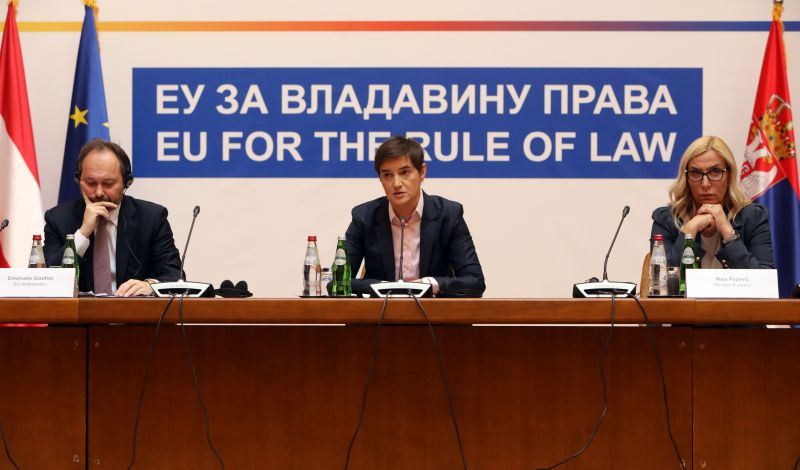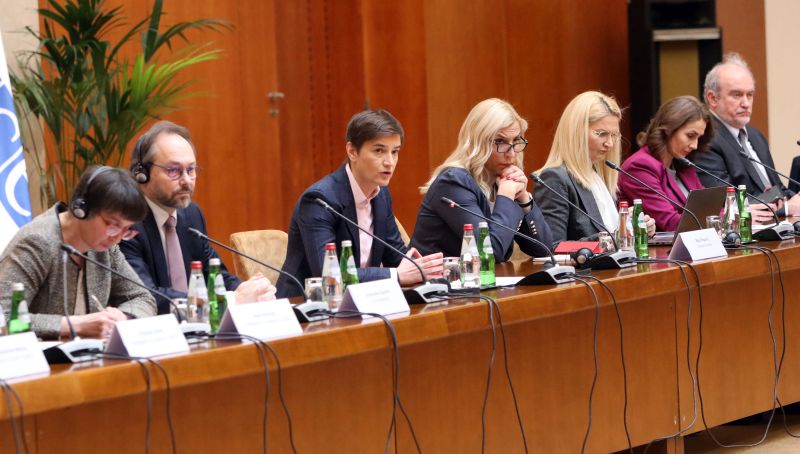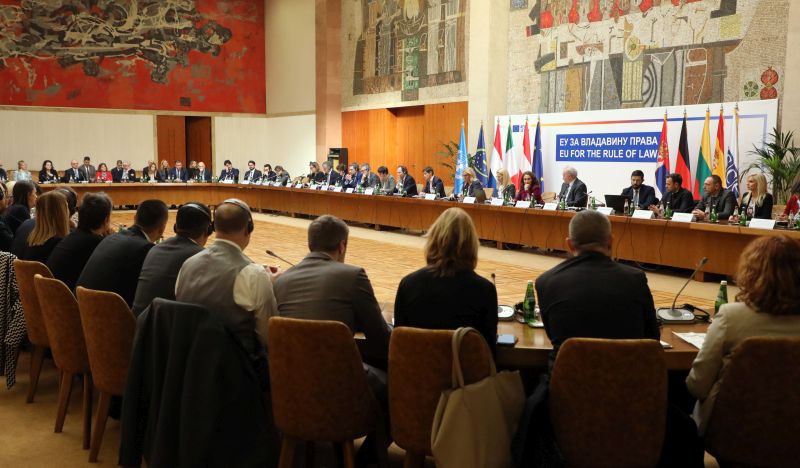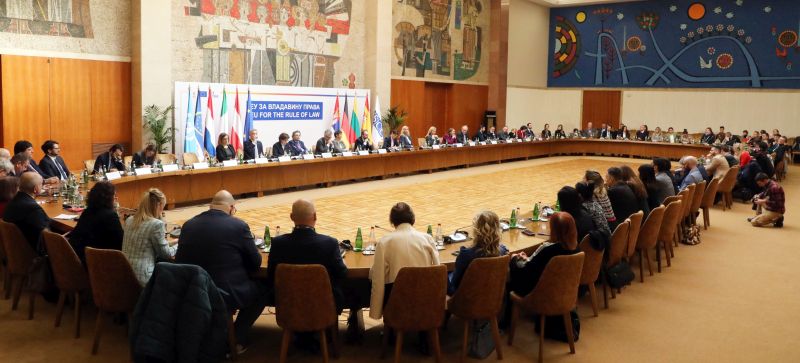Prime Minister Ana Brnabic pointed out today that our country has achieved significant results in the field of the rule of law and, with the aim of further progress in this area, we will continue our work in this area, with the support of our European partners.
- Serbia
Get to know Serbia
- Citizens
Culture and science
Health services
Pension and disability insurance
- Business
Employment
Economy
- Media
- Government
- Contact
Keep in touch
Keepin touch
Whether you have a question, comment, suggestion or any problem in the purview of the government, send us your message and we will try to respond as soon as possible. If your problem is not in our purview, we will forward your message to the relevant institution.
Serbia achieves significant results in field of rule of law
At the presentation of the "EU for the rule of law" project, Brnabic recalled that the Venice Commission of the Council of Europe gave a positive opinion on all five drafts of judicial laws that are in line with the changes to the Constitution, and for which the public discussion began on 16 December.
She added that the goal is for these legal solutions to be adopted by the Serbian parliament in February, and that after that Serbia expects their full implementation, stressing that the rule of law is one of the basic conditions on the road to European integration of our country.
The Prime Minister expressed her belief that the government will ensure the full independence of the judiciary and the independence of the prosecutor's office in this mandate, announcing the adoption of a new strategy for the prevention of corruption, for the preparation of which a working group has been formed.
This working body will start its work in January 2023, Brnabic pointed out and expressed the hope that Serbia will have a new strategy by June.
According to her, the rule of law is an important topic not only because of Serbia's European path, but also because of the better quality of life of citizens, as the availability of justice, efficiency of the courts, as well as the fight against crime and corruption directly affect the quality of life.
The Constitutional amendments prevent any kind of perception of politicians' influence on the judiciary, because judges are not elected by politicians, but by other judges, and the independence of the Prosecutor's Office is enabled too, she explained.
Also, we expect help for the introduction of information technologies in the work of judicial bodies, which is extremely important for Serbia, because the weakest point of our judicial system is the efficiency of the courts.
Head of the EU Delegation in Serbia Emanuele Giaufret said that Serbian accession to the EU depends on the normalisation of relations with Pristina, but also on the rule of law, which is one of the main conditions of integration.
He pointed out that the EU recognised Serbia's efforts to implement reforms in the area of the rule of law, through strengthening the independence of the judiciary and the Office of the Public Prosecutor, stressing that Serbia was praised in this field in the latest EU report.
Giaufret welcomed the announced adoption of the anti-corruption strategy and assessed that the continuation of the fight against organised crime is very important.
The European Union allocated €20.8 million to support reforms in the area of the rule of law. The assistance is intended to fulfil the objectives within Chapters 23 and 24, as part of Serbia's negotiations on EU membership.
The support package consists of four components, and EU member states and international organisations participate in their implementation.
The topics covered by the programme include the fight against corruption and organised crime, the improvement of fundamental rights and the strengthening of technical capacities for Chapters 23 and 24, but also the improvement of the independence of the judiciary.
-
 Belgrade, 23 June 2025
Belgrade, 23 June 2025Prime Minister on working visit to Athens
-
 Belgrade, 20 June 2025
Belgrade, 20 June 2025Serbia, Egypt committed to strengthening trade, political ties
-
 Belgrade/Cairo, 19 June 2025
Belgrade/Cairo, 19 June 2025Gratitude to Egypt for support in evacuating Serbian citizens from Israel
-
 Belgrade/Cairo, 19 June 2025
Belgrade/Cairo, 19 June 2025Potential to enhance cooperation with Egypt in multiple fields
-
 Belgrade/Cairo, 19 June 2025
Belgrade/Cairo, 19 June 2025Serbia committed to preserving peace, understanding among religious communities
-
 Belgrade/Cairo, 18 June 2025
Belgrade/Cairo, 18 June 2025Serbia firmly committed to nurturing historical, spiritual ties with Egypt
-
 Belgrade/Cairo, 18 June 2025
Belgrade/Cairo, 18 June 2025Exceptionally substantial talks between Macut, Arab League Secretary-General
-
 Belgrade/Cairo, 17 June 2025
Belgrade/Cairo, 17 June 2025Considerable space for multifold increase in trade exchange with Egypt
-
 Belgrade/Cairo, 17 June 2025
Belgrade/Cairo, 17 June 2025Egypt is Serbia’s true ally, partner
-
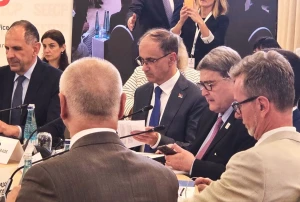 Belgrade/Tirana, 16 June 2025
Belgrade/Tirana, 16 June 2025Serbia fully supports further intensification of regional cooperation

